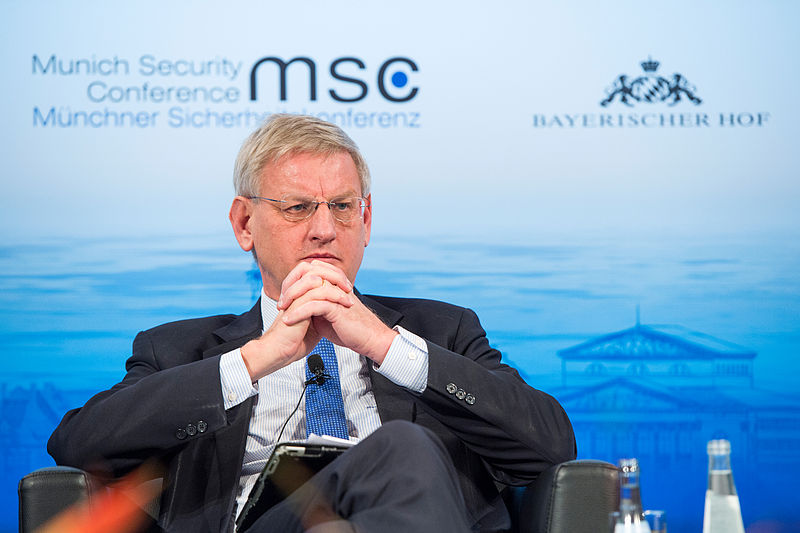
After the initial euphoria of Joe Biden's victory in the 2020 US presidential election, Europeans could see American politics descend into anti-democratic violence and it might take a long time before their confidence in the transatlantic relationship is restored, Swedish politician and former international administrator in Bosnia and Herzegovina, Carl Bildt, wrote in his recent article.
“A sigh of relief swept across Europe when it became clear that Joe Biden would replace Donald Trump in the White House. New leadership in the United States would mean that after four years of disruption to the transatlantic relationship, an era of constructive cooperation on bilateral and global issues was at hand,” Bildt wrote in his article entitled ‘Can America Be Trusted Again?’, which was published on the Project Syndicate news portal.
“But in recent weeks, that previous sense of relief has given way to nervousness as the US political scene has plumbed new depths of dysfunction,” he wrote, adding that “America’s democratic institutions have withstood assaults unlike anything seen since the Civil War.”
He mentioned that “the ransacking of the US Capitol on January 6 – broadcast live to a stunned world – will not soon be forgotten.”
“The hatred and disdain for democracy exhibited by the insurrectionists will not disappear with Trump’s departure. Millions of Trump supporters around the country will maintain the false belief that the election was stolen. Trump has left American society deeply wounded, and Europe with an abiding sense of nervousness and concern for its longtime ally’s future,” he wrote.
He argued that a lot has changed since early December, when the European Commission released a document outlining its vision for renewed EU-US cooperation.
“But while European institutions and governments will remain ready to answer America’s call, they should not assume smooth sailing. The winds have changed,” he wrote.
Bildt mentioned a poll of 11 EU member states commissioned by the European Council on Foreign Relations (ECFR) that shows that European attitudes toward the US have shifted substantially during the Trump era.
“A majority of respondents in EU member states believe that the US political system is broken; that Europe can’t rely on the US for its defense; that China will be more powerful than the US within a decade; and that Europe should not take sides in a conflict between the two.”
It also said that across the countries polled, “51% do not think that the US can overcome its internal divisions and invest in addressing key global issues that concern the future of Europe.”
“Though there are of course differences between countries, they are small. Even in the United Kingdom, with its “special relationship” to America, 81% of respondents believe that the US political system is completely or somewhat broken. Only in Hungary and Poland do a majority believe otherwise,”
Some 60% of Europeans would prefer the EU staying out out of the rivalry between the US and China and only 22% of respondents in the ECFR poll believe Europe should back the US, while 6% think it should side with China, he noted, adding that “attitudes about the US are far more reserved than in the past, and confidence in Europe’s ability to shape its own future has grown (whether that outlook reflects reality is another matter).”
“In a world of changing power relationships, US-EU cooperation is urgently needed. There is no way for either side to prevail against global challenges by going it alone. The transatlantic link is the foundation on which wider global cooperative networks must rest,” Bildt stressed.
But the nervousness in Europe following the recent events in the US “cannot simply be willed away” and “will linger, implying at least some impact on diplomacy and policymaking,” Bildt argued, adding that immediate risk is that America’s political turmoil will “bolster those who are already calling for Europe to blaze its own trail, build new barriers, or retreat from the world.”
“If Europe’s traditional and natural ally is no longer reliable, what other choice is there? That is the question now hanging over European policy and strategy debates.”
According to Bildt, although Biden will be welcomed with “near-universal jubilation” in most of Europe, “it will take much longer to settle the question of whether Trump was an historical aberration or a harbinger of what is yet to come.”
“As such, the shift in European public opinion will pose an ongoing challenge for US and European leaders alike. The Biden administration must do whatever it can to restore trust in US society and policymaking; and European leaders must convince a skeptical domestic audience that it should support measures to restore transatlantic ties. The ECFR poll suggests that European leaders have their work cut out for them. But failure is not an option. With new leadership in Washington, DC, now is the time to ensure that the nightmare of the past four years is never repeated,” he concluded.
Kakvo je tvoje mišljenje o ovome?
Učestvuj u diskusiji ili pročitaj komentare





 Srbija
Srbija
 Hrvatska
Hrvatska
 Slovenija
Slovenija







